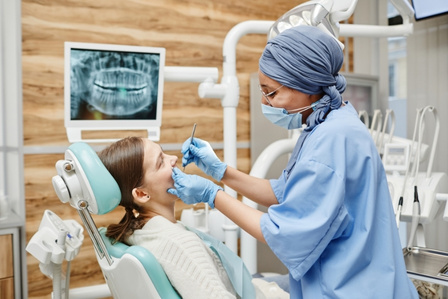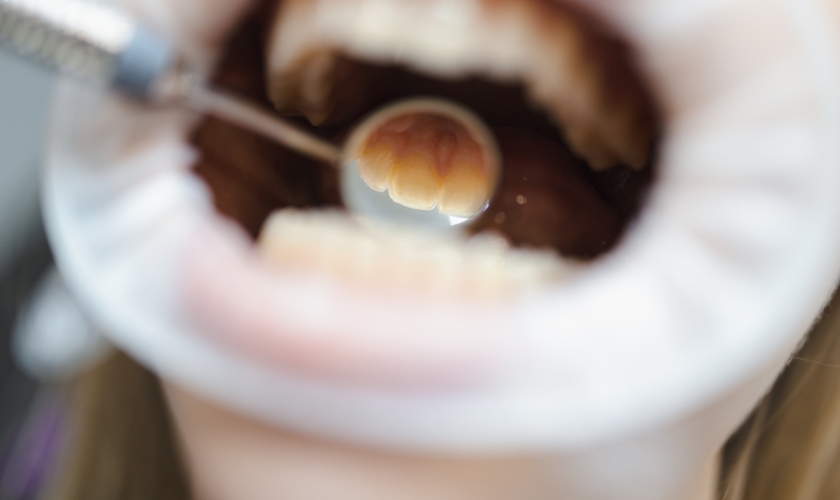
Visiting the dentist for the first time can feel overwhelming, but a new patient dental exam is designed to be a smooth and informative experience. This initial visit is more than just a checkup—it’s an opportunity to assess your oral health, discuss concerns, and create a personalized care plan.
Understanding what happens during this exam can help ease any anxiety and ensure you’re prepared. From reviewing your dental history to professional cleaning and treatment recommendations, every step is tailored to support your long-term oral health.
Here’s what you can expect during your first dental exam.
Review of Medical and Dental History
Before any examination begins, your dentist will take time to review your health history. This step helps in identifying any factors that may impact your oral health.
What to Expect?
- You’ll be asked about past dental treatments, such as fillings, crowns, or extractions.
- The dentist will inquire about existing medical conditions, medications, and allergies.
- You may discuss lifestyle habits, such as smoking, diet, and oral hygiene routine.
- If you have any dental concerns—like tooth sensitivity, jaw pain, or gum bleeding—this is the perfect time to bring them up.
Why It Matters?
- It helps in detecting any underlying health issues affecting your teeth and gums.
- Ensures treatments align with your overall health needs.
- Allows the dentist to provide personalized recommendations.
Comprehensive Oral Examination
A thorough dental exam in Maize, KS, helps your dentist assess your oral health and detect potential issues early.
What’s Included?
Visual Inspection:
- The dentist examines your teeth, gums, and tongue for signs of decay, infection, or gum disease.
- Check for oral cancer symptoms, like unusual lumps or sores.
- Evaluates tooth alignment and bite function.
Dental X-rays:
- Provides a deeper look at hidden cavities, bone loss, or impacted teeth.
- Helps in diagnosing wisdom teeth positioning or jawbone issues.
- Typically painless and quick, using minimal radiation.
Gum and Bite Assessment:
- Measures gum depth to check for early signs of gum disease.
- Evaluate your bite alignment and look for signs of TMJ disorders.
Why Is This Step Important?
- Early detection of dental problems can prevent bigger issues.
- Ensures a comprehensive understanding of your oral health needs.
- Helps in planning preventive and corrective treatments.
Professional Cleaning and Preventive Care
Even if you brush and floss regularly, professional cleaning is essential for optimal oral health.
What Happens During the Cleaning?
- Plaque and Tartar Removal: A hygienist uses special tools to remove stubborn buildup from teeth and gum lines.
- Teeth Polishing: A gentle polishing treatment helps smooth enamel and remove stains.
- Fluoride Treatment (if needed): Helps strengthen teeth and prevent cavities.
- Personalized Hygiene Tips: Your dentist may recommend changes to your brushing and flossing techniques for better results.
Benefits of Professional Cleaning:
- Reduces the risk of cavities and gum disease.
- Helps keep your breath fresh and teeth stain-free.
- Provides a deeper clean than regular home care.
Treatment Discussion and Next Steps
Once the exam and cleaning are complete, your dentist will review the results and discuss any necessary treatments.
What This Includes?
- A summary of your overall oral health.
- Discussion of any identified concerns, such as cavities, gum inflammation, or misalignment.
- Explanation of recommended treatments, like fillings, orthodontics, or further preventive care.
- Tips on maintaining a healthy smile between visits.
- Opportunity to ask questions or address any concerns.
A new patient dental exam is crucial in maintaining. By understanding what to expect, you can approach your visit with confidence. With regular checkups, you can prevent problems before they turn into major issues. With professional cleanings, you can maintain a bright and healthy smile for a long time.
If it’s time for your first visit, don’t hesitate to schedule an appointment today! Taking this step toward preventive care will set the foundation for a lifetime of better oral health.


